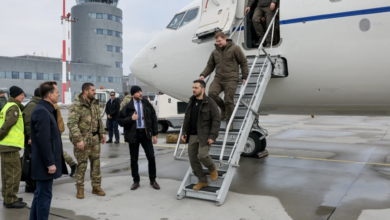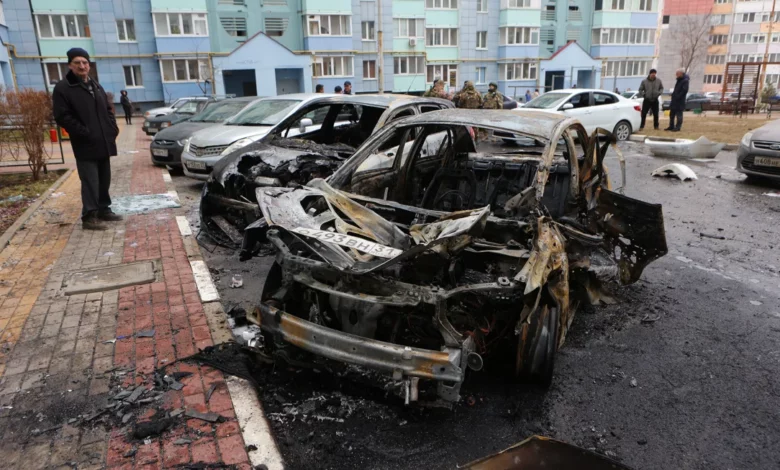
Deserted streets, shuttered shops and silent restaurants. Damaged buildings and craters from missile strikes pockmarking the asphalt. Arrows on house facades signposting the nearest bomb shelters and stock of emergency supplies.
The once-tranquil city of Belgorod, some 25 miles north of Russia’s border with Ukraine, has been transformed into a kind of ghost town, its eerie silence interrupted by the regular wail of missile warning sirens – a reminder that the war raging in neighboring Ukraine looms ever closer.
Reporting from the region is complicated by media restrictions and government control over press freedom. Many Russians are afraid to speak openly for fear of prosecution.
Against that backdrop, residents of Belgorod have shared with CNN their struggle to navigate an uncertain future in the city, where everyday life has been irrevocably altered by the full-scale invasion of Ukraine launched by Russia in February 2022. Conversations were conducted by phone and audio messages.
Belgorod has been the launch site for many rocket and missile attacks on Ukraine, and a key military hub for Russia’s invading forces. In 2023, after a year of strikes on its towns and cities, Ukraine changed tactics and expanded its operations more overtly onto Russian territory, putting Belgorod region firmly in its crosshairs.
In recent weeks, the Belgorod region has been subject to almost daily shelling and drone attacks. Russian authorities blame Ukraine and report having repelled the attacks, while also admitting destruction and casualties caused by them. The Belgorod region has borne the brunt of the war compared to more distant Russian regions, which have been relatively untouched.
The governor of Belgorod region, Vyacheslav Gladkov, said on March 23 that 24 people had been killed and 152 injured in the span of less than two weeks.
‘Alarmed Belgorod’
At the peak of the shelling of Belgorod, Timur Khaliullin, the 36-year-old organist for the Belgorod Philharmonic, took a rollerblade ride through the city center’s deserted streets to show others what it looked like, in a video titled “Alarmed Belgorod.”
Khaliullin points to the sealed-off doors of shops and restaurants and the arrows leading to shelters, emergency kits and basements where residents can take cover.
Just as he reaches the central square and puts on his rollerblades, the sirens go off. “Can you hear that? That’s how frightening the sirens sound. It’s an air raid alarm. It means there will be incoming fire now, I need to take cover,” Khaliullin says from behind the camera.
He seeks refuge inside one of the empty, white-painted concrete boxes positioned at regular intervals throughout the square, each marked with the word “Shelter.” Screens stationed around the square instruct residents on proper conduct during shelling, offer guidance on administering first aid and echo patriotic encouragements. One of the messages reads, “The battle for Russia persists. Victory will be ours!”
As the sirens stop, Khaliullin resumes his rollerblade ride, filming empty streets, and people waiting at the bus stops. According to locals, those traveling by public transport often spend hours standing at stops until the all-clear signal sounds, allowing buses to run again, and the city to resume its life – until the next missile threat.
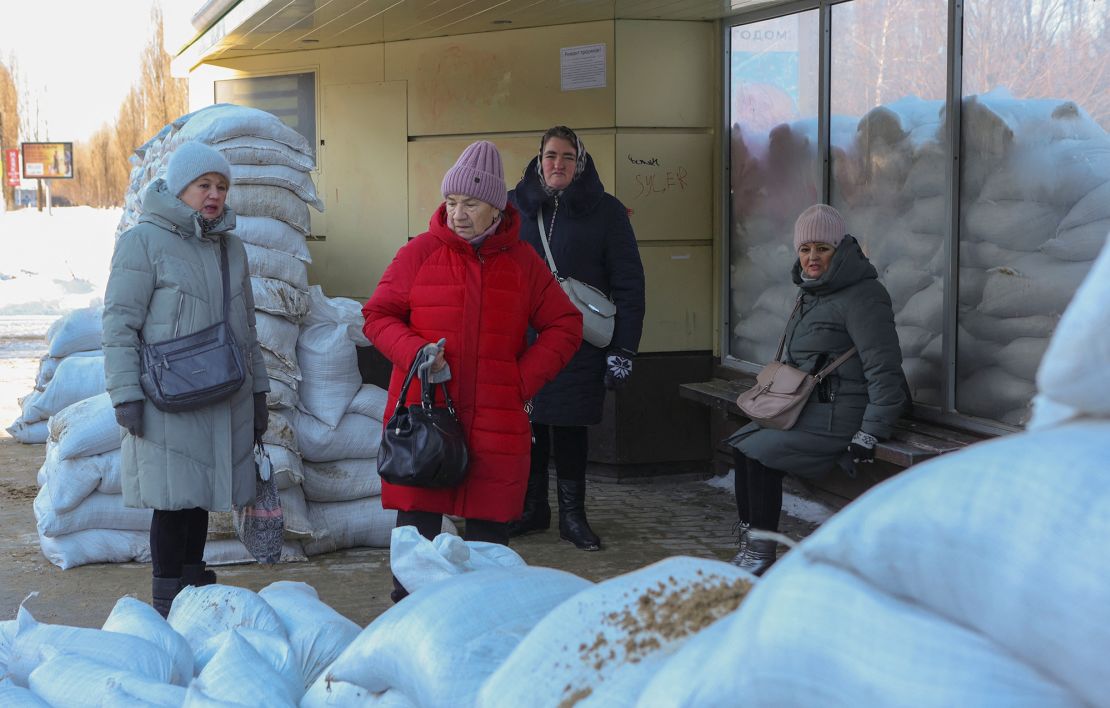
This is not how the city always looked. Describing her hometown of Belgorod pre-war, 25-year-old volunteer Natalia Izotova painted a charming picture. “It’s a small, cozy southern town with lots of trees and lots of greenery, which gets very hot in the summer,” she told CNN. “It’s such a quiet, tiny place where everyone simply lives their life and tries to change something for the better in every way they can.”
Born and raised in Belgorod, Izotova said despite the “terrible fear” she experiences every time the sirens go off, she is hesitant to leave, bound as she is by her work with a local charity helping people with special needs. “You live in a very large cocoon of misunderstanding and fear. At the same time, you don’t really want to leave the city. But the Belgorod you remember no longer exists.”
Now that the city has emptied out, far fewer people dare to step outside unless they have to, she said. “They still try to venture onto the streets, but it’s all getting gloomier. The city is becoming more ghostly.”
Deadly shelling
In mid-March, amid escalating Ukrainian attacks and with warning sirens sounding four to five times daily, Gladkov, the regional governor, announced the closure of malls and schools, and the cancellation of classes for two days in several regions, including the city of Belgorod.
Videos emerging from Belgorod showed scenes of chaos as people drove through thick smoke and burned-out cars, as well as damaged buildings and residents fleeing with their belongings amid the sounds of explosions and distant air-raid sirens.
The main square’s tiled pavement bears shrapnel damage – a reminder of a shell that fell on December 30 during one of the most devastating attacks. Toys and flowers have been placed on the steps nearby in memory of those lost.
Following a major air attack on Ukraine by Russia overnight into December 29, Kyiv retaliated a day later by targeting the Belgorod region. At least 25 people were killed, including three children, and 113 were injured that day, Gladkov said, making it the deadliest shelling within Russia since the war began.
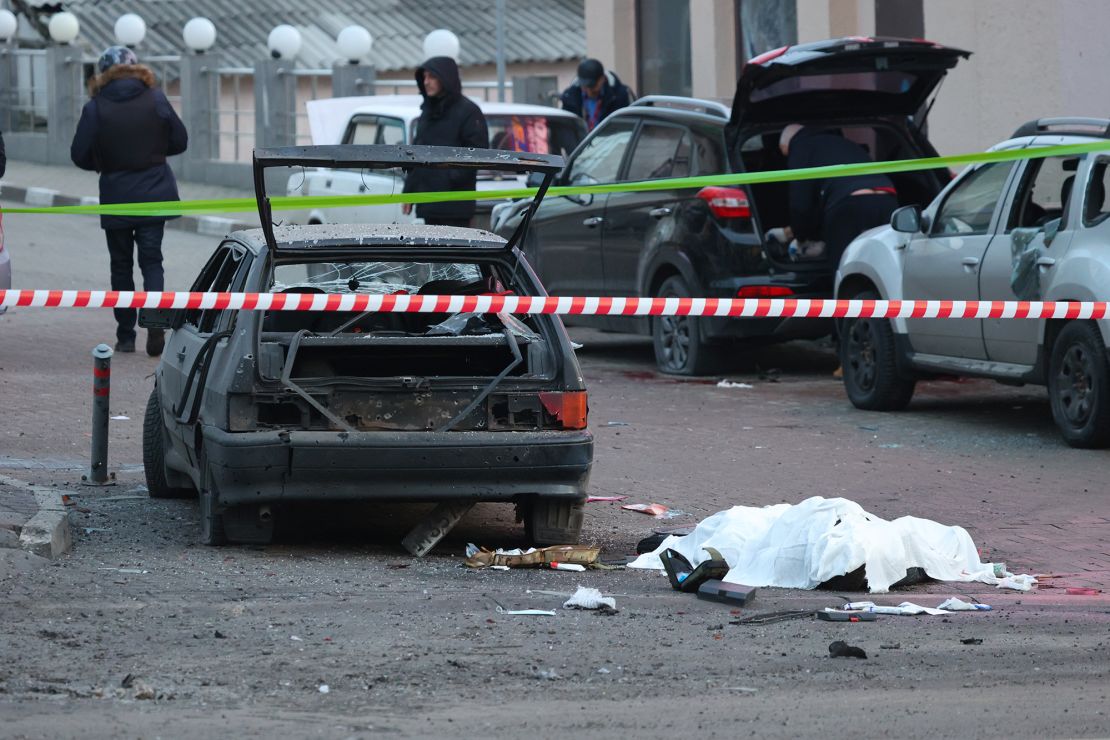
“This is the darkest day we’ve had recently,” 24-year-old Elizaveta, who asked to be identified only by her first name for safety concerns, told CNN. She was among those who witnessed the December 30 attack.
As she left her job at a beverage chain store near the city center, she heard explosions. At first, everyone thought it was the usual sound of air defense operations.
“And then I saw it all: everything on fire, covered in smoke, buses stopped running, and taxis weren’t moving either because the roads were completely blocked,” she recalled.
“At some point, the city just died, no one expected this. Many people perished, and the entire city mourned and continues to mourn to this day.” Life there has not been the same since, she said. Her store has seen fewer customers, with many people afraid to step out of their homes.
‘Lifeless’ city
Like many others in Belgorod, Elizaveta has family in Kharkiv, across the border, with whom she has not spoken since they fell out in the first few months of the war. Kharkiv, Ukraine’s second largest city, has suffered a recent increase in Russian attacks.
“Here in Belgorod, many of us have relatives on both sides of the border. People from Belgorod frequently visited Kharkiv, and vice versa. It’s truly disheartening to see such a rift between people who were once so closely connected,” Elizaveta told CNN.
“I long for a return to normalcy, when people feel less fearful and regain a sense of security. The city is lifeless: stepping out to the streets at any hour you don’t see anyone or any vehicles, it’s as if you’re on a deserted island.”
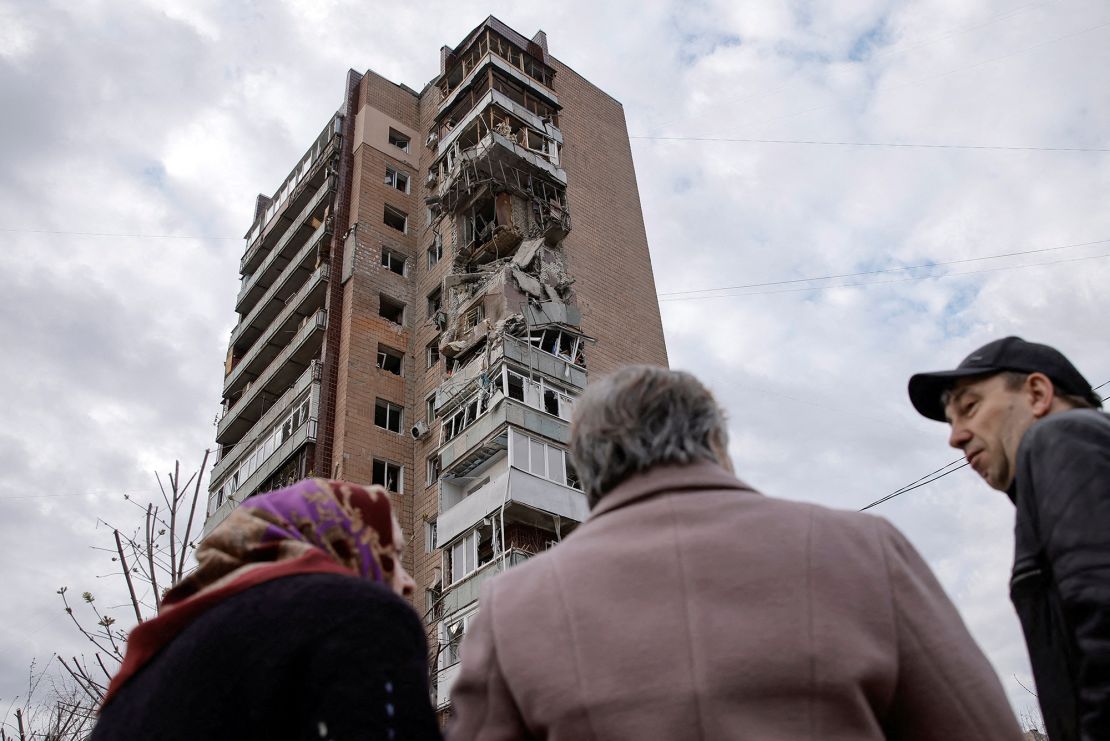
Vasily, a 27-year-old human relations manager who asked only to give his first name for safety reasons, described a pervasive sense of anxiety that accompanies his fellow residents every time they set foot outside the house, the fear of shelling or missile attacks weighing heavily on their minds.
By the end of March, the disruptions caused by the attacks had become so predictable that setting a morning alarm seemed redundant. “You don’t even need to set an alarm anymore because like clockwork, at 8 in the morning, we’re met with another shelling, another missile launch, air defense operations or other war-related operations,” he told CNN.
Looting amid chaos
As the situation deteriorated, essential services began to falter. Shops and eateries were closing their doors, and food deliveries were becoming increasingly sporadic. Confronted with the reality of living in a conflict zone, Vasily, like many other residents, contemplated leaving the city but decided to stay because his wife is enrolled at a local university.
“Swathes of people in Belgorod are opting to move either further away from the region or entirely out of it, basically, anywhere far from the border where it should potentially be less dangerous,” Vasily said.
While the authorities have never ordered a general evacuation, Gladkov disclosed on March 30 that 5,000 children had been evacuated to more secure regions, including St. Petersburg, Bryansk and Makhachkala. In total, the authorities were planning to relocate approximately 9,000 children to other regions due to ongoing shelling, state media reported.
Deserted areas have witnessed an escalation of crime and disorder. In early April, the head of the Grayvoron district in Belgorod region sounded the alarm over a rise in looting incidents, with the highest number of such cases reported in the district’s border settlements.
The authorities have since said they aim to restore the border territories in time for Victory Day on May 9, when Russia commemorates the victory over Nazi Germany in 1945.
Meanwhile, the border villages in Belgorod region remain largely abandoned and in a state of disrepair, and authorities don’t seem in a hurry to encourage residents to return home.
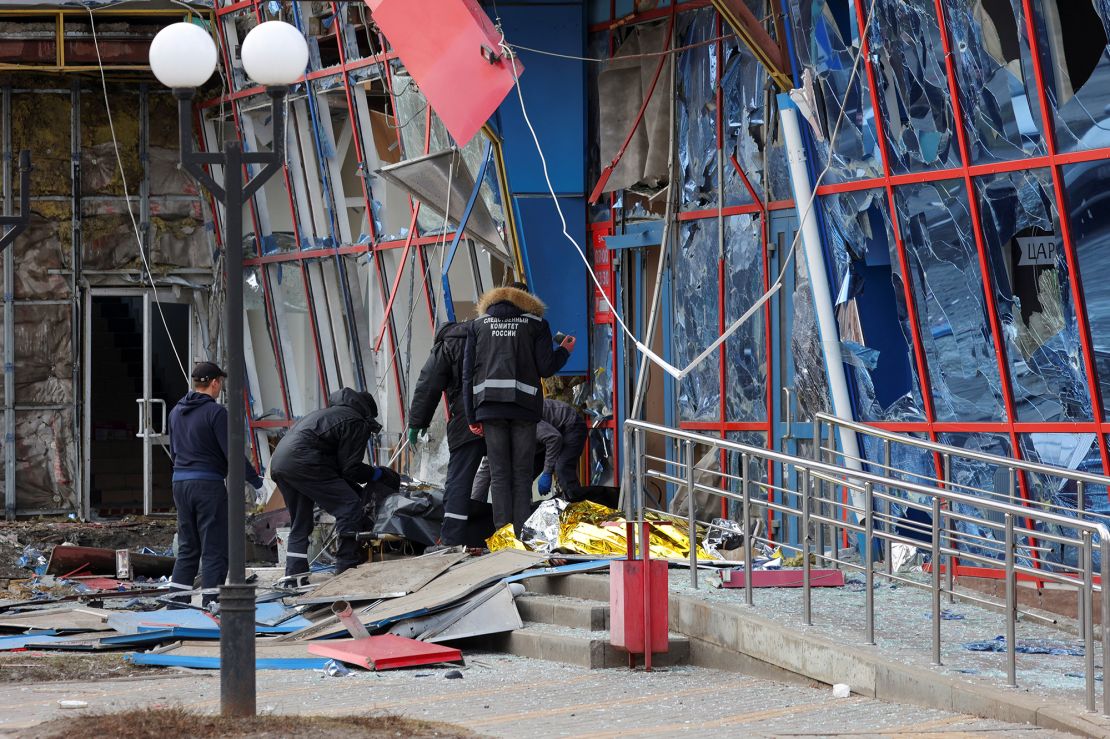
As the war drags on, those who remain in Belgorod become less optimistic about the future.
“Considering that Russia is fighting in a way that what is left behind is scorched earth, I have a great fear that scorched earth may be left from the territory around Belgorod as well,” Vasily said.
Volunteer Izotova voiced a similar sentiment, describing the overwhelming sense of abandonment that has loomed large since the December 30 attack – a feeling that has only grown more pronounced in recent weeks.
In one of his latest references to the Belgorod region, Russian President Vladimir Putin expressed his “appreciation” and “admiration” for its residents’ courage and pledged support to it and other border regions.
Despite that assurance, according to Izotova, many residents of Belgorod still feel neglected by the media, authorities and the broader Russian population, which appears oblivious to the war.
The challenges faced by Belgorod appear to have been overlooked, she said, which in turn has led even those who oppose the war to feel that sympathy should no longer be extended only to the Ukrainian victims.
“While panic, fear and uncertainty persist, people are still trying to offer help. I think our main task right now is to assist those facing hardship – both Ukrainians (suffering from the Russian aggression) and victims of the conflict within Russia,” Izotova said.
“It is important not to remain silent or divert attention to comparisons of suffering, but rather to acknowledge the reality of war and remember who instigated it. Russia is entrenched in perpetual sorrow, experiencing it internally while also imposing it on others.”


